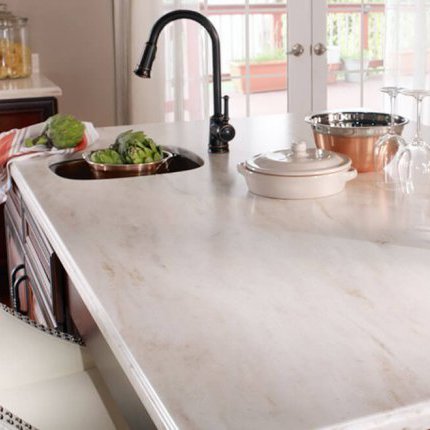
Porcelain is a viable option for countertops and has become increasingly popular in recent years. Porcelain countertops offer several advantages, but they also have some considerations to keep in mind. Here are the pros and cons of using porcelain for countertops:
Pros:
- Durability: Porcelain is a very durable material, making it resistant to scratches, heat, and impact. It can withstand the rigors of daily kitchen use.
- Stain Resistance: Porcelain countertops are non-porous, which means they are highly resistant to staining. Liquids and spills are less likely to penetrate the surface.
- Easy Maintenance: Porcelain is relatively low-maintenance. It can be easily cleaned with mild soap and water, and it doesn’t require sealing, unlike natural stones like granite or marble.
- Design Variety: Porcelain countertops come in a wide range of colors, patterns, and finishes. They can mimic the appearance of natural stone, wood, concrete, or other materials, offering versatile design options.
- Hygienic: Because it is non-porous, porcelain is resistant to bacterial growth, making it a hygienic choice for kitchen countertops.
- Consistency: Unlike natural stone, which can have variations in color and pattern, porcelain slabs are consistent in appearance, which can be desirable for some homeowners.
- Longevity: Properly maintained porcelain countertops can have a long lifespan, potentially lasting for decades.
Cons:
- Weight: Porcelain countertops can be heavy, so proper support is essential during installation.
- Fragility: While porcelain is highly durable, it can be prone to chipping or cracking if subjected to heavy impact.
- Cost: Porcelain countertops tend to be more expensive than some other materials, including laminate or tile.
- Installation: Proper installation by experienced professionals is crucial to ensure the countertop’s longevity and performance.
- Edges: The edges of porcelain countertops may be prone to chipping if not adequately protected or if subjected to heavy impact.
- Limited Repair Options: Unlike natural stone, which can be repaired and refinished if damaged, porcelain countertops are challenging to repair if chipped or cracked.
Ultimately, whether porcelain is a good choice for your countertops depends on your specific needs and preferences. It is an excellent option for those seeking durability, low maintenance, and a wide variety of design possibilities. However, it’s essential to consider the upfront cost, weight, and the potential for chipping or cracking in your decision-making process. If you choose porcelain, be sure to work with experienced professionals for the installation to ensure the best result
